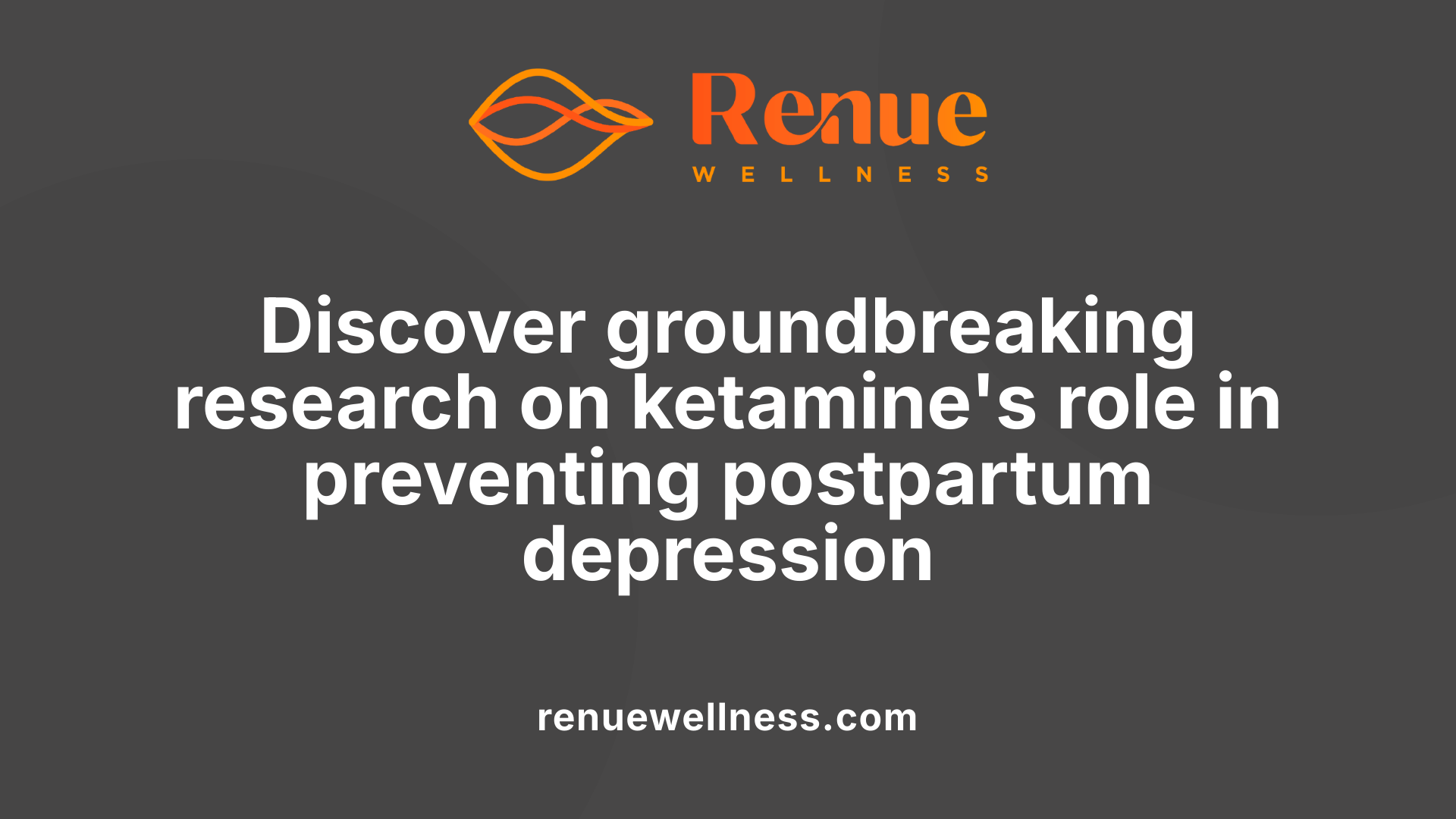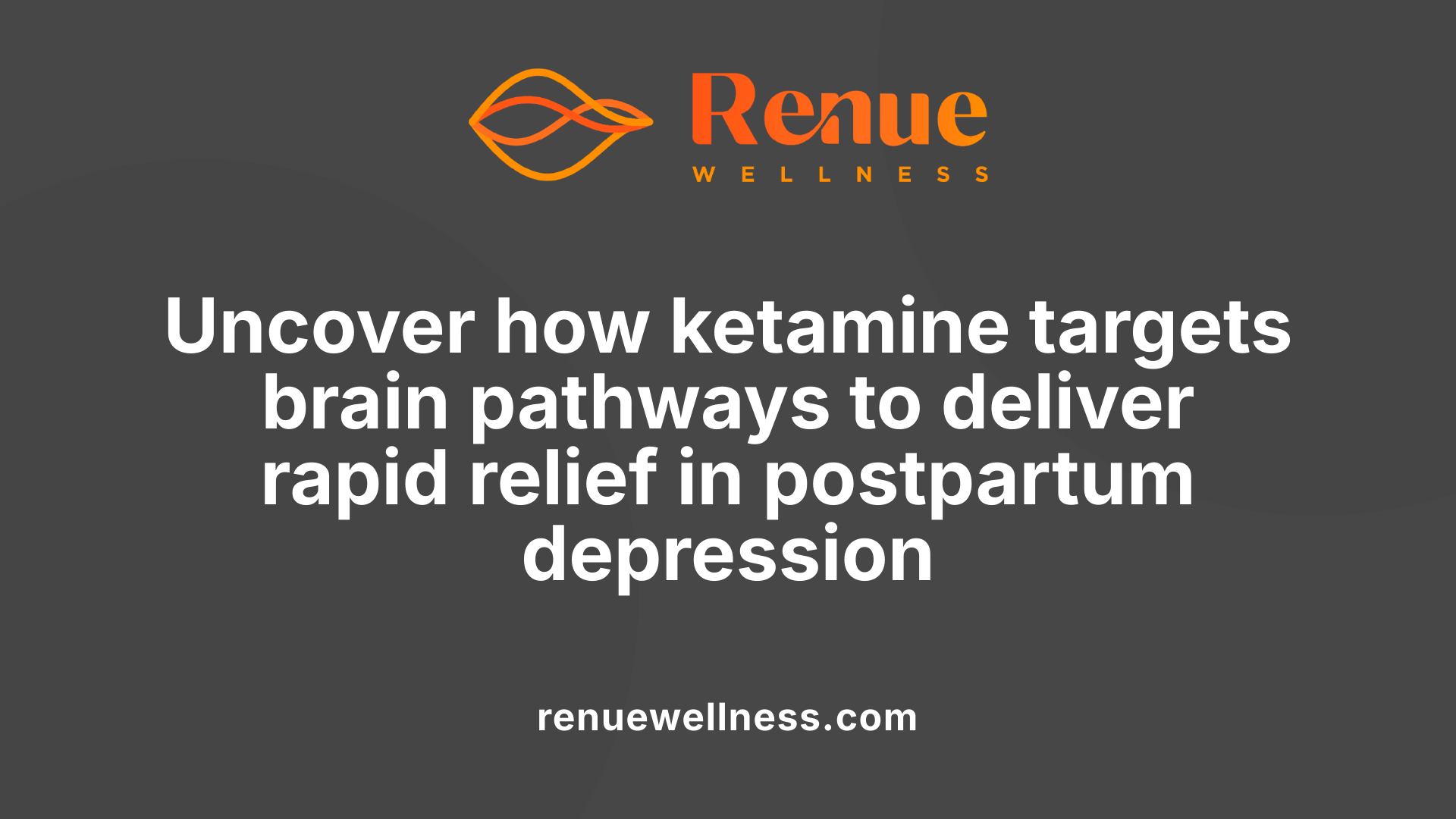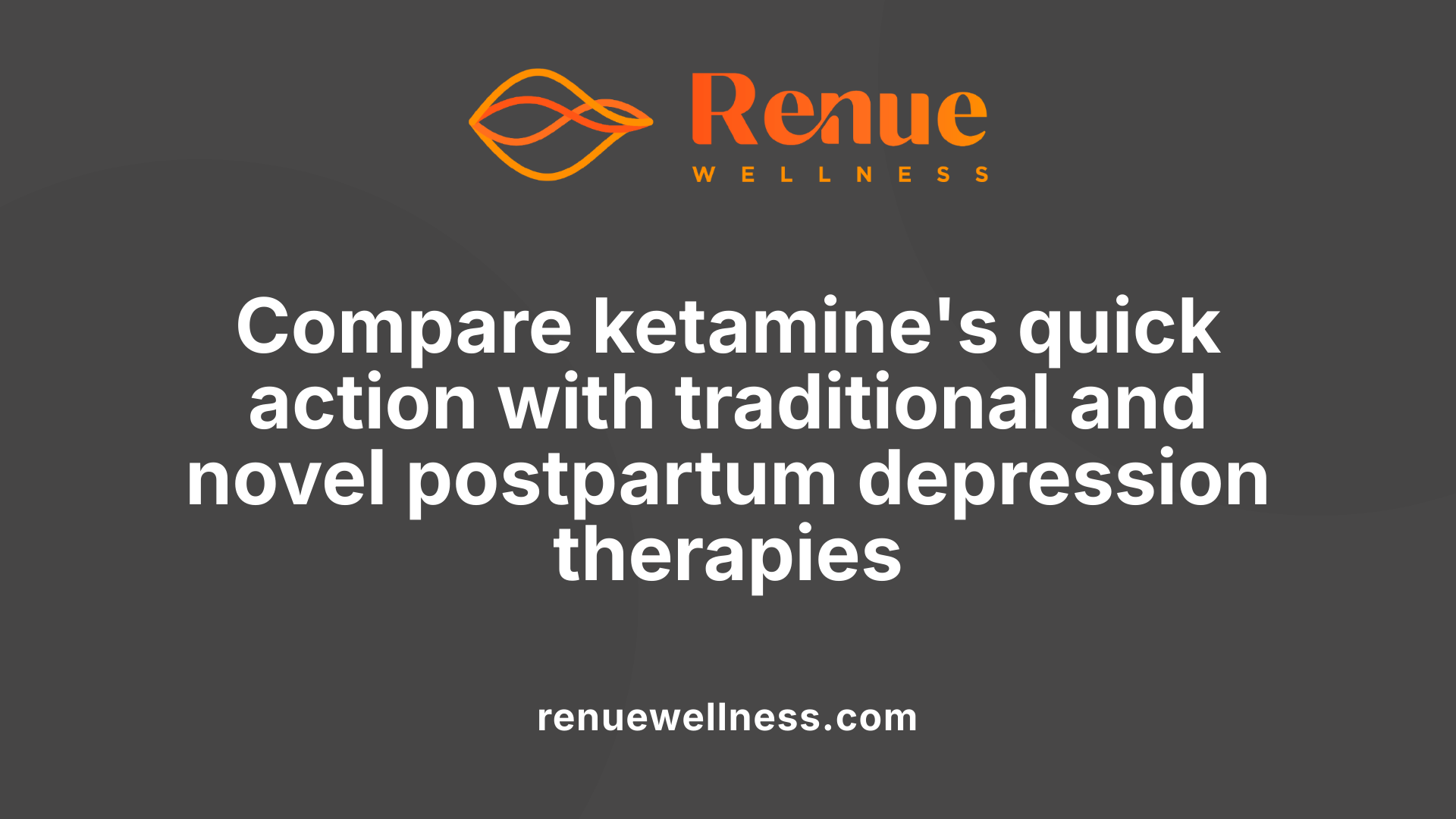Postpartum Depression Therapy: Ketamine as a Rapid Solution


July 17, 2025
Understanding Postpartum Depression and the Need for Rapid Interventions
Postpartum depression (PPD) is a complex and severe mood disorder that affects new mothers, impacting emotional well-being, bonding, and overall quality of life. Recognized symptoms include persistent sadness, hopelessness, mood swings, and sleep disturbances, among others. Given its potential to interfere with maternal and infant health, early diagnosis and swift treatment are crucial. Traditional therapies, while effective over time, often pose challenges in delivering rapid relief, creating a demand for innovative solutions that act swiftly to alleviate symptoms and improve outcomes.
Study Highlights Ketamine's Potential in Preventing Postpartum Depression

What are the symptoms of postpartum depression?
Postpartum depression (PPD) manifests through a variety of emotional and physical symptoms that can significantly impact a woman's well-being. Common symptoms include persistent sadness, feelings of hopelessness, loss of interest in daily activities, and severe mood swings. Women may experience intense irritability, excessive crying, difficulty bonding with their newborn, and social withdrawal. Physically, PPD can cause sleep disturbances such as insomnia or hypersomnia, appetite changes like overeating or loss of appetite, and fatigue. Some women also report anxiety or panic attacks, physical aches, and even thoughts of harming themselves or their baby. These symptoms typically develop within the first few weeks after childbirth but might occur anytime up to a year postpartum. Without treatment, they can last for months or longer, hindering a mother’s ability to care for herself and her child.
What are rapid treatment options available for postpartum depression?
For women experiencing postpartum depression, rapid relief options are crucial, especially during this vulnerable period. Traditional antidepressants, such as SSRIs, often take several weeks to show benefits and may pose risks for breastfeeding infants due to metabolites passing into breast milk. To address this delay, emerging therapies like ketamine infusions have gained attention. Ketamine acts quickly—sometimes within hours—making it suitable for severe cases. Recently, medications like brexanolone, administered over 60 hours, have provided swift symptom improvement but require hospital monitoring. Psychotherapy methods, including cognitive-behavioral therapy (CBT) and interpersonal therapy (IPT), can offer timely relief when started early. In severe or resistant cases, electroconvulsive therapy (ECT) may be considered. The combination of medications and psychotherapy often results in faster and more effective recovery, with ketamine’s rapid action making it a promising addition to postpartum depression treatments.
What is known about the safety and efficacy of ketamine therapy for postpartum depression?
Current studies suggest that ketamine and esketamine may be both safe and effective in preventing and reducing postpartum depression, especially when used around the time of delivery. In randomized controlled trials, administering ketamine during cesarean section anesthesia induction has led to significant reductions in postpartum depression scores at two and four weeks post-surgery. Similarly, recent BMJ research showed that a single low dose of esketamine immediately after childbirth significantly lowered the rate of postpartum depression at six weeks—from about 25% in the placebo group to just 6.7% in the esketamine group.
These treatments generally display a good safety profile, with most side effects being transient, including dizziness, sedation, hallucinations, and mild dissociation that typically do not require medical intervention. Despite promising results, most studies focus on prevention rather than treatment of established postpartum depression, so further research is essential to establish definitive safety and efficacy standards for widespread clinical use.
What scientific research exists regarding ketamine as a treatment for postpartum depression?
Scientific investigations into ketamine’s role in postpartum depression have grown substantially. A notable randomized, double-blind trial involving women undergoing cesarean sections found that ketamine administered during anesthesia induction substantially decreased depressive symptoms at two and four weeks postpartum. Additionally, a comprehensive BMJ study with 364 women confirmed that a single low dose of esketamine administered shortly after childbirth resulted in a marked decrease in postpartum depression incidence at six weeks—from 25.4% in the placebo group to just 6.7%. This research demonstrated significant symptom reduction, with many women showing improvements within the first week.
Meta-analyses combining multiple studies further support ketamine’s potential, especially in the context of preventive strategies during or immediately after delivery. However, most existing research concentrates on prevention and early symptom relief, not on treating severe or long-standing postpartum depression. Therefore, more extensive trials are necessary to confirm ketamine’s effectiveness as a standard treatment option and to understand optimal dosing and administration protocols.
| Aspect | Findings | Additional Details |
|---|---|---|
| Symptoms of PPD | Sadness, irritability, sleep issues, anxiety, thoughts of harm | Develops postpartum, lasts months without treatment |
| Rapid treatments | Ketamine infusions, brexanolone, psychotherapy | Provide faster relief; ketamine acts within hours |
| Safety and efficacy | Promising but data limited for treatment | Transient side effects; more research needed |
| Scientific evidence | Positive results in randomized trials | Focus on prevention; less on long-term treatment |
Mechanisms Behind Ketamine’s Rapid Action in Postpartum Depression

How does ketamine work as a treatment for postpartum depression?
Ketamine treats postpartum depression mainly by targeting the brain’s glutamate system. It works as an NMDA receptor antagonist, which means it blocks certain receptors involved in glutamate signaling. This action promotes synaptic plasticity, helping the brain form new connections and recover from depressive states quickly. By restoring balance in neurotransmitters like glutamate and GABA, ketamine alleviates symptoms of depression rapidly. Clinical studies support the effectiveness of low-dose ketamine or esketamine, especially administered during or after childbirth, in significantly reducing postpartum depression severity and risk. Overall, its ability to modulate glutamate transmission underlies its fast-acting antidepressant properties.
What biological effects contribute to ketamine’s antidepressant properties?
Ketamine’s antidepressant effects are rooted in its capacity to enhance neuroplasticity and reduce inflammation in the brain. It stimulates the formation of new neural pathways, which is crucial for reversing depression-related neural damage. Additionally, ketamine has anti-inflammatory properties, lowering levels of pro-inflammatory cytokines and increasing anti-inflammatory molecules, which may help decrease neuroinflammation linked to depression.
Furthermore, ketamine reduces overactivity in regions like the Default Mode Network (DMN), which is often associated with rumination and negative thoughts. By modulating neurotransmitter systems and promoting neurogenesis, ketamine offers both rapid and durable relief from postpartum depressive symptoms.
Are there unique molecular targets of ketamine relevant to postpartum depression?
Yes, the main molecular target of ketamine is the NMDA receptor within the glutamate system. Its blockade of this receptor triggers a cascade of neurochemical changes, improving synaptic strength and encouraging new neural growth. Beyond NMDA receptors, ketamine’s influence extends to modulating GABAergic signaling and inflammatory pathways—both crucial in mood regulation. Emerging research suggests that ketamine’s neuroprotective and anti-inflammatory actions could be especially beneficial during postpartum, helping to rebalance neurochemical systems disturbed in postpartum depression.
The combined effects on glutamate, GABA, and inflammatory processes make ketamine a promising, rapid-acting treatment option for postpartum depression, with effects that can persist for weeks to months after a single infusion.
Comparison with Traditional and Alternative Treatments

How does ketamine compare to traditional therapies for postpartum depression?
Ketamine, especially in low doses, stands out for its rapid action in alleviating postpartum depression (PPD) symptoms. Unlike traditional antidepressants such as SSRIs, which can take several weeks to become effective and may risk passing into breast milk, ketamine provides almost immediate relief, often within hours. This makes it particularly valuable during the critical postpartum period.
Research indicates that when administered during cesarean sections, ketamine may even offer a protective effect against developing postpartum depression. Its safety profile is favorable; it does not impact breastfeeding, and its side effects, including dizziness and hallucinations, are generally transient. This rapid antidepressant impact is especially beneficial for women resistant to conventional therapies.
Despite promising results, further research is necessary to confirm its long-term safety and determine the best protocols for widespread use. Nevertheless, ketamine offers a promising alternative for mothers needing swift symptom relief compared to the slower, sometimes less effective traditional treatments.
What are the benefits and risks compared to other rapid treatments like brexanolone or TMS?
Ketamine's primary advantage over other rapid treatments such as brexanolone and transcranial magnetic stimulation (TMS) lies in its convenience and speed. Brexanolone requires a prolonged infusion over several days in a hospital setting, which can be costly and time-consuming. In contrast, ketamine infusions are short, outpatient procedures, often completed in about 40-60 minutes, with benefits appearing within hours.
TMS therapy involves stimulating specific brain regions and also offers a non-invasive option, with minimal impact on breastfeeding and long-term safety. While effective, TMS typically takes several sessions over weeks to show significant improvement.
Ketamine combines rapid onset with flexible outpatient administration, making it particularly suited for urgent symptom relief. However, transient side effects such as dissociation and dizziness necessitate monitoring during treatment.
Are there limitations to ketamine's use in postpartum depression treatment?
Yes, despite its promise, ketamine's use in PPD has limitations. One significant concern is the limited data on long-term safety and efficacy, especially for breastfeeding women. Most studies focus on short-term effects, and more research is required to understand potential risks over extended periods.
Furthermore, ketamine must be administered in a controlled clinical environment due to its psychoactive effects and potential for misuse. Costs and access to specialized clinics can also restrict its widespread use.
In addition, individual responses vary, and not all patients may benefit equally. Therefore, healthcare providers must carefully evaluate each case, considering potential risks, benefits, and the availability of ongoing monitoring.
| Aspect | Traditional Treatments | Rapid Treatment Options | Considerations |
|---|---|---|---|
| Wait time for effect | Several weeks | Hours to a few days | Speed of relief is crucial postpartum |
| Administration setting | Often outpatient or standard | Outpatient clinics, hospital | Accessibility varies |
| Side effects | Nausea, sexual dysfunction | Dizziness, hallucinations | Monitoring needed |
| Long-term data | More extensive | Limited, ongoing studies | Safety profile still under review |
| Breastfeeding safety | Variable, some risks | Generally safe | Important for new mothers |
This comparison highlights the evolving landscape of postpartum depression treatment, with ketamine emerging as a rapid, effective, and well-tolerated option with some limitations that warrant further study.
Looking Ahead in Postpartum Mental Healthcare
As research continues to evolve, ketamine emerges as a promising rapid-acting treatment for postpartum depression, with the potential to transform mother-infant outcomes through swift symptom relief. While evidence shows its safety and efficacy in preventive contexts, especially around cesarean sections, further robust clinical trials are essential to establish its role as a standard treatment. Integrating innovative therapies like ketamine into postpartum care could address unmet needs, particularly for treatment-resistant cases, and improve the emotional well-being of mothers during one of their most vulnerable periods. With ongoing scientific validation and responsible clinical application, ketamine may soon become a vital component of comprehensive postpartum mental health strategies.
References
- The effect of ketamine on preventing postpartum depression - PMC
- Home | SAMHSA - Substance Abuse and Mental Health Services ...
- Is Ketamine or Esketamine an Option for the Treatment of ...
- Rapid Relief for Postpartum Depression - Lone Star Infusion
- Ketamine as potential treatment for postpartum depression - PubMed
- Postpartum Depression Treatment - Ketamine Clinics Los Angeles
- Ketamine Therapy for Postpartum Depression in Boca Raton, FL
- Ketamine Treatment for Postpartum Depression - Nushama
Recent Posts
Conditions Treated
AnxietyDepressionOCDPTSDPostpartum DepressionPain ManagementSubstance AbuseSuicidal IdeationOur Location


